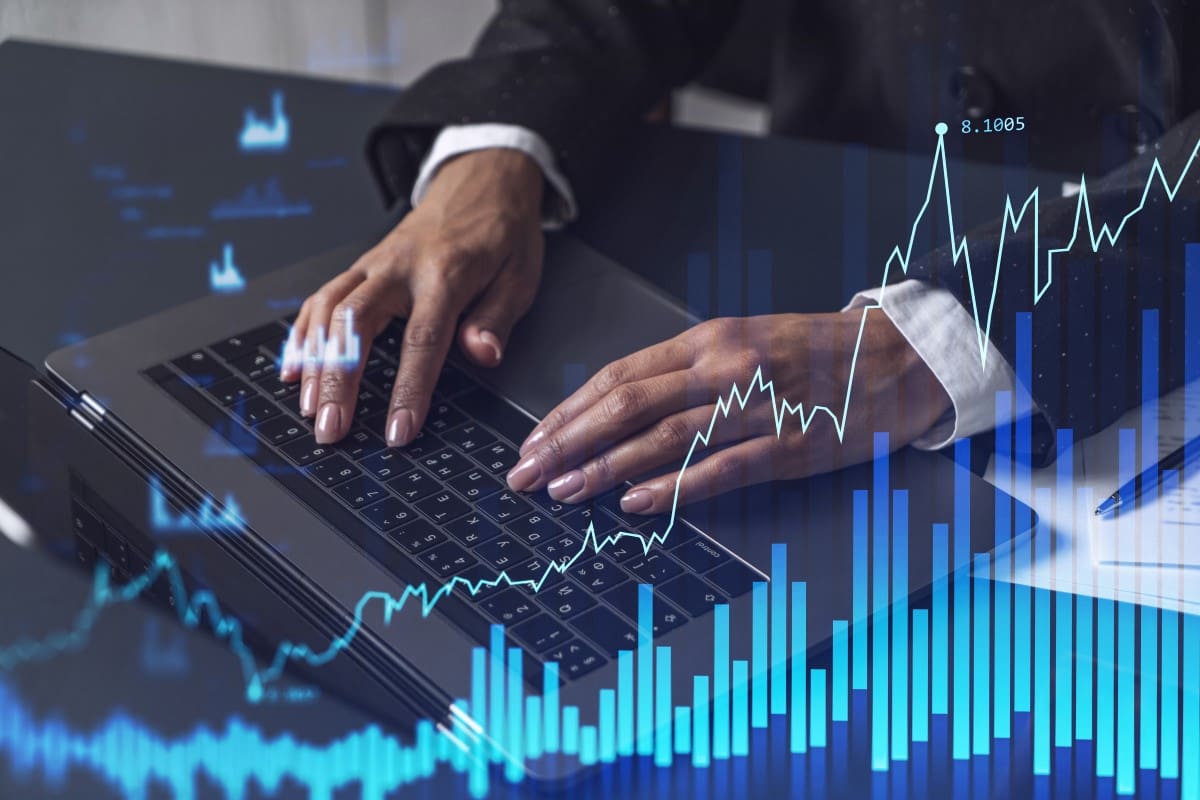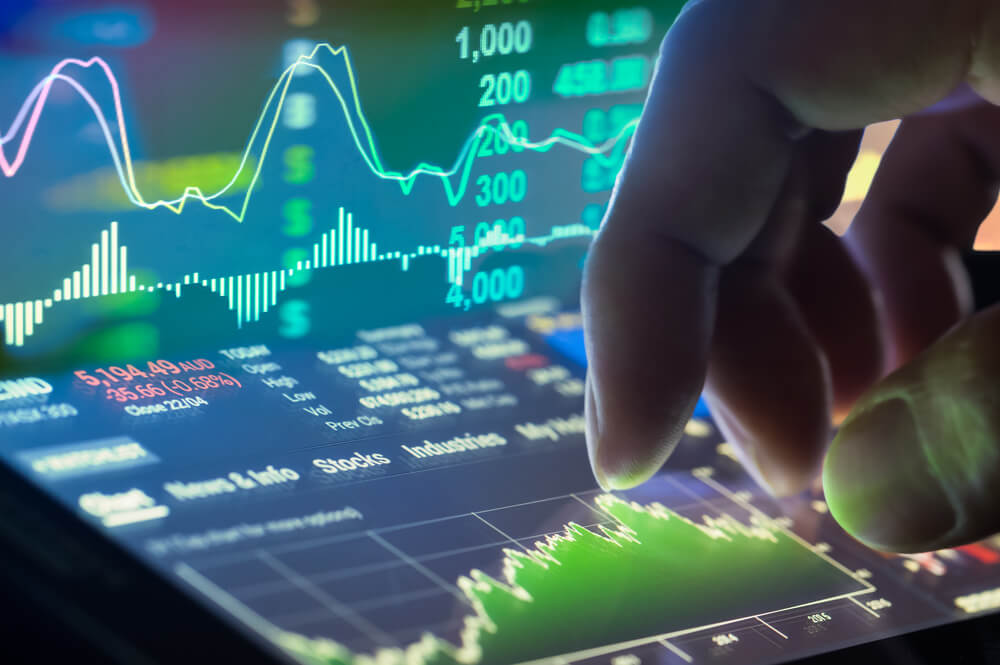CFD Trading Guide
With the growing economy and everybody wanting to be a part of the financial markets, it is only genuine to ask how to go about CFD trading as this provides the ability to trade on leverage with low costs. In this guide, you will learn the basics of CFD trading to get an overall idea of how to get started with CFD trading.
In This CFD Trading Guide
- What does CFD stand for?
- How does CFD trading work?
- What are the Benefits of CFD trading?
- What exactly is a CFD account?
- What assets can be traded with CFDs?
- What are some risk management strategies?
- Margin
- Hedging
- Final Thoughts
What Does CFD Stand For?
CFD trading, or Contract for Difference trading, is a type of financial derivative that allows traders to speculate on the price movements of financial instruments such as stocks, indices, currencies, and commodities without actually owning the underlying asset. Instead, traders enter into a contract with a broker to exchange the difference in the price of the asset at the time the contract is opened and closed.
For example, if a trader believes the price of a particular stock is going to go up, they can enter into a CFD contract to buy that stock. If the stock price does indeed go up, the trader can then close the contract and pocket the profit. On the other hand, if the stock price goes down, the trader will incur a loss.

How Does CFD Trading Work?
As mentioned above in simple terms, traders get to speculate on the various assets in multiple financial markets. They get to analyse the future market movements to plan their moves accordingly. This works well as they do not need to physically own the asset.
When a trader opens a CFD position, they select the number of contracts intended to buy or sell. Then, depending on the moves they make to follow that up, profit will either rise or fall, but they will make profits only if the market moves in their favour.
Below are some key concepts to understand this a little better;
Four Key Concepts Of CFD Trading Are Mentioned Below :
Spread And Commission:
Spread :
A spread is the difference between the offer and bid prices that is quoted for the particular asset. This is how derivatives are priced. The spread is the key cost while trading CFDs which is why it is a must to choose a broker that has tight spreads to save on cost.
Commission :
It is a fee charged by the broker depending on the asset that gets converted to the trader’s account according to the broker’s rate.
CFDs Are Always Quoted In Two Prices : The Buy And Sell Price
To make it clear
- The buy price is when a trader opens a long CFD
- The sell price is where they open a short CFD
Deal Size
CFDs are traded in lots. A lot is basically a unit of currency. The size of individual contracts depends on the underlying asset that the trader chooses to trade. .
Duration
Most of the CFD trades have no fixed expiry date. A position is closed by placing a particular trade in the opposite direction to the one opened. There is also the forward contract which has an expiry date sometime in the future with overnight funding charges included in the spread mentioned.
Profit And Loss
The deal size of the position by the value of each contract, once that is multiplied. The answer is then multiplied by the difference in points between the open and closing prices of the contract.

What Are The Benefits Of CFD Trading?
It can be tough to filter through what is right or wrong, especially in a market. So, here are some benefits that you should know of CFD trading before diving into it.
1. Leverage
This is why many traders use CFD trading so they get a chance to use leverage. CFD leverage allows the traders to gain access to a larger portion of the market with a small deposit. Depending on the plan and strategy the trader goes with, leverage will be obtained accordingly. Using leverage always involves a high amount of risk so it is advised to learn as much as one can before entering such risk.
2. Trade Short Or Long
In general, trading in financial markets means to make a profit when the market is at a high or rising. With CFD trading, traders and investors get to trade long and short which means when the market is falling or rising, there is a chance to make profit. This is also another reason why professional traders are most likely to do CFD trading.
- Buying long means that the value of the asset traded will increase and therefore, traders get to open a ‘buy’ trade at a much lower price, which they can later sell at a higher price. This is how they make profit on a long CFD trade.
- Buying short means the trader knows the asset’s price is falling or will decrease in the near future so the trader opens a sell trade which they later close at a lower price. The profit is made on the difference.
Trading long or short has its own perks and cons so do your research and find out exactly which one suits the plan moving forward to make the desired profit outcome.
3. Wide Range Of Financial Markets
One of the main reasons why CFD trading is so popular amongst traders is because they get to trade in various financial markets through a single CFD trading platform. This opens an opportunity for them to learn and expand as they grow.
4. Costs
The costs are lower as compared to other investments. CFDs have a lower cost of entry which is why many traders, beginners as well as experts, choose to trade CFDs. The lower margin requirements are a tease. There are no open or closing fees, either. Brokers earn on the spread. There are always two prices quoted – one to buy and one for selling. Hence, traders need to pick the best option they get if they wish to lower cost and increase profit.
5. Trading Hours
The prices vary of each asset depending on the market if it’s rising or falling. Hence, for the entire trading week, there is always something to trade so below mentioned are some trading hours that could help kickstart your journey ;
- Index CFDs : 24 hours, 5 days a week
- Forex CFDs : 24 hours, 5 days a week
- Share CFDs : depending on the active trading hours
- Commodity CFDs : 24 hours, 5 days a week
Note : Trading off market hours is risky so proceed with caution.
What Exactly Is A CFD Account?
A CFD account is where a trader invests money to use in the various capital markets. This account is generally opened with a reputed broker.
There is also an option of opening a demo account which allows the trader to get familiar with how the market process works by trading virtual currency. Before selecting a broker, make sure to go through their website to match the specifications.
What Assets Can Be Traded With CFDs?
Some Of The Assets That Can Be Traded Are:
- Foreign exchange
- Commodities
- Indices
- Stock shares
- Cryptocurrencies
What Are Some Risk Management Strategies?
Before using CFDs, it is a must to do intense research as CFD trading comes with lots of risk. Creating risk management strategies is necessary to be able to survive in the market for a longer time. You do benefit from leverage, but it also involves high risks, so it is necessary to use it with care and take necessary precautions.
Many traders deal with negative account balance which is why choosing a broker that deals with it priorly is utterly important.
Below Listed Are Three Methods To Averse Risk :
-
Be Calm And Cool
It is very normal to get emotional and lose control of their minds. Discipline and following a plan can keep the mind calmer than usual. Dealing with the market can be quite stressful which is why it is better to gain knowledge and try to focus on the main goal which is to earn profit. They can check out automated trading as a way of lowering risk as soon as they begin. This might give them some time to get used to the markets.
-
Manage Money Well
Money management plays a strong role in this market. Without proper money management, it is not possible to earn profit. Placing stop loss can help in attracting major risk to your account. Traders shouldn’t risk more than 2% on each trade. As long as money management strategies are applied, smaller losses are easier to accept, making room to earn profit consistently.

-
Look At Technical Analysis
Luck has no business here, so basing decisions on luck can only prove to be impractical. Understanding technical analysis can be worth it for shorter trades. Learning how to read charts to base decisions depending on which direction the market is moving towards can benefit. There are a lot of resources out there that could help with understanding technical analysis like seminars, books and other resources. Traders should be well aware of the fundamental aspects too but focus should be on technicals. Look into it and plan strategies according to your budget and how much risk to take on.
-
Margin
A margin gives traders a chance to open CFD positions at the fraction of a full value rather than paying for the entire position beforehand. Traders get the exposure to the financial markets on a higher level which is not always the case.
Sometimes, levered trading is also referred to as ‘trading on margin’ as the funds required to open and maintain a position that is the margin which is a fraction of its total size.
Two Types Of Margin During Trading CFDs:
-
Deposit Margin
It is required to open a position.
-
Maintenance Margin
This may be required in case the trade gets close to incurring a loss that the deposit margin and additional capital in the account won’t cover. When this happens, you will probably have to add funds to the account to close the position.
Hedging
CFDs are also used to hedge against any losses that could occur during the trading process in the existing portfolio. Traders are known for being analysts, so if they view the market and predict that a particular asset could suffer from a dip, they can do hedging. This will result in a gain at the end of it.
Final Thoughts
CFD trading gives traders the chance to trade in multiple financial markets without the stress of spending too much on deposit. Many professional investors and traders use CFD trading to make quick returns. By using leverage, it helps traders magnify their profits. Before trading CFDs, investors must get expert advice to avoid taking on any risk that is beyond their capacity.
It is very important to be educated on CFDs before making any move in the market. Traders need to constantly gain knowledge and pick up new skills to upgrade their information on how to trade well. This could take time so moving with caution is the only way to succeed in such a volatile market environment.
The market prices are subject to change so it is necessary to understand the market psychology of financial markets to increase chances of gaining success.
